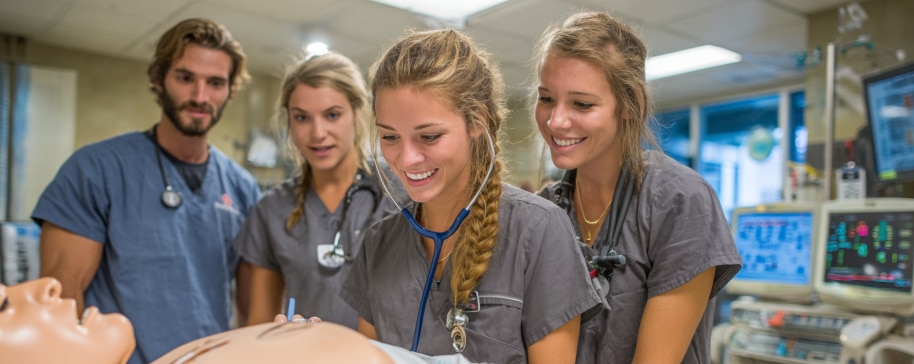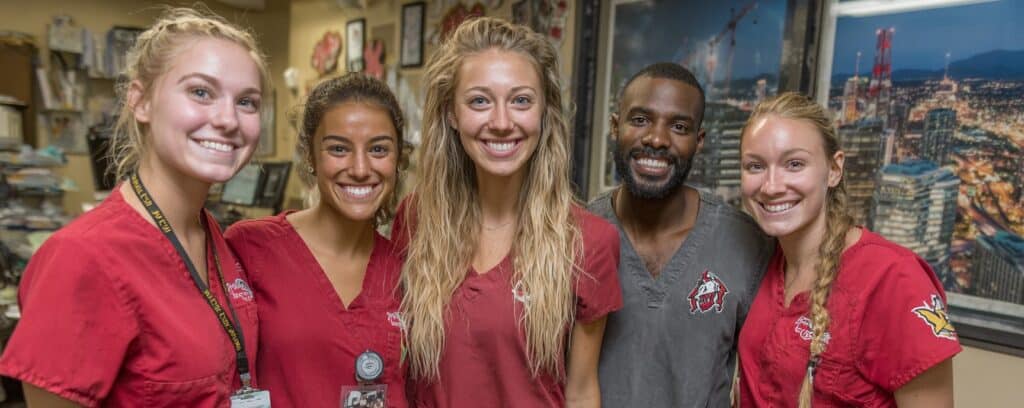Accelerated Bachelor of Science in Nursing (ABSN) programs in Chicago provide a fast pathway for students with a non-nursing bachelor’s degree who want to transition into nursing. These programs combine classroom learning, simulation labs, and clinical rotations to prepare graduates for RN licensure.
As one of the nation’s largest healthcare hubs, Chicago offers ABSN students access to world-class hospitals and medical centers. The city’s diverse patient populations, respected nursing schools, and high demand for registered nurses make it a strong choice for those pursuing accelerated nursing education.
What Is an ABSN Program?
An Accelerated Bachelor of Science in Nursing (ABSN) program is designed for individuals who already hold a non-nursing bachelor’s degree and wish to transition into nursing without completing a traditional four-year program. These programs condense the BSN curriculum into an intensive 12 to 24-month format, combining classroom instruction, simulation labs, and clinical rotations in hospitals and community health settings.
Students engage in courses covering topics like pharmacology, health assessment, nursing ethics, and population health, along with immersive hands-on experience to prepare for real-world nursing practice. If you’re comparing options, you may explore affordable ABSN programs and review the best accelerated BSN programs for quality and outcomes.
Graduates of accredited ABSN programs become eligible to take the NCLEX-RN exam, which is required for licensure as a registered nurse in Chicago and across the U.S.
Why Choose an ABSN Program in Chicago?
Chicago stands out as an excellent place to pursue an Accelerated BSN, offering both educational quality and unmatched clinical opportunities. (To discover wider regional options, check out the overview of ABSN programs in Illinois.)
Access to Respected Nursing Schools
The Chicago area is home to multiple well-regarded universities and colleges that offer ABSN pathways, many of which are affiliated with nationally recognized healthcare systems. These programs emphasize academic rigor alongside robust clinical training.
Diverse Clinical Training Opportunities
Students benefit from clinical rotations at some of the nation’s top hospitals, including Northwestern Memorial Hospital, Rush University Medical Center, Advocate Health Care, and the University of Chicago Medical Center. Exposure to diverse patient populations and specialized units gives ABSN students broad and valuable experience.
Strong Job Market for Nurses
As a major metropolitan hub, Chicago has a high demand for registered nurses across hospitals, outpatient centers, long-term care facilities, and community health organizations. This demand translates into consistent job opportunities for new graduates.
Competitive Salaries
Registered nurses in Chicago typically earn above the state average, providing strong earning potential alongside the city’s urban lifestyle and career advancement opportunities. While the cost of living is higher than in other parts of Illinois, the concentration of healthcare employers and opportunities offsets this challenge.
Notable ABSN Programs in Chicago
Chicago offers several Accelerated BSN programs designed for students with a non-nursing bachelor’s degree who are ready to transition into nursing. These programs differ in length, delivery format, and clinical partnerships, but all blend intensive coursework with real-world training to prepare graduates for RN licensure. Below is an overview of ABSN options available in the Chicago metro area, each with unique strengths and clinical opportunities.
| Institution | Location | Program |
| Elmhurst University | Elmhurst | Online Accelerated BSN |
| Lewis University | Romeoville | Pre-Licensure Bachelors-BSN Track (Accelerated) |
| Loyola University Chicago | Maywood | Accelerated Bachelor of Science in Nursing |
| Saint Xavier University | Chicago | Accelerated BSN (BSN/ACC) |
Accreditation and Licensing Considerations
Before enrolling in an Accelerated BSN program in Chicago, it’s important to understand how accreditation and licensure shape your nursing career path.
Importance of Accreditation
Accreditation ensures that a nursing program meets rigorous standards of academic quality and professional preparation. In Chicago, ABSN programs are typically accredited by one of the following national organizations:
- Commission on Collegiate Nursing Education (CCNE)
- Accreditation Commission for Education in Nursing (ACEN)
Graduating from an accredited program is crucial for:
- Eligibility to take the NCLEX-RN exam
- Access to federal financial aid
- Meeting employer requirements, as most hospitals and healthcare providers require accredited degrees
Illinois Board of Nursing
The Illinois Board of Nursing, under the Illinois Department of Financial and Professional Regulation (IDFPR), oversees RN licensure in the state. To become a registered nurse, students must:
- Graduate from an accredited nursing program
- Pass the NCLEX-RN exam
- Apply for licensure through the Board, including submission of transcripts and a criminal background check
Nurse Licensure Compact (NLC)
Illinois is not currently a member of the Nurse Licensure Compact (NLC). This means nurses licensed in Illinois must apply separately for licensure if they wish to practice in other states. For Chicago ABSN graduates, this may limit initial portability, though many nurses still find abundant opportunities locally.
Admission Requirements
Admission to Accelerated BSN programs in Chicago is competitive, reflecting the intensity of the curriculum and the demand for nursing education. While requirements vary by school, most programs share a core set of expectations.
Typical ABSN Admission Criteria
- Non-Nursing Bachelor’s Degree
Applicants must hold a bachelor’s degree in a field other than nursing from a regionally accredited institution. - Prerequisite Coursework
Foundational science courses are typically required and must often be completed within the last 5–10 years. Common prerequisites include:
- Anatomy and Physiology I & II
- Microbiology
- Chemistry
- Nutrition
- Statistics
- Developmental or Lifespan Psychology
- Anatomy and Physiology I & II
- Minimum GPA
Many programs require a minimum GPA of 3.0, although some may consider applicants with slightly lower GPAs if they show strength in other areas. - Application Materials
Typical supporting documents include:
- Résumé or CV highlighting academic, professional, and volunteer experience
- Personal statement or essay explaining motivations for pursuing nursing
- Letters of recommendation from academic or professional references
- Résumé or CV highlighting academic, professional, and volunteer experience
- Healthcare or Volunteer Experience
While not always mandatory, relevant experience in healthcare or community service is often preferred and can strengthen an application.
Program Costs and Financial Aid
Accelerated BSN programs in Chicago require a significant financial commitment, but the investment can lead to rewarding career opportunities in one of the nation’s largest healthcare markets. Costs vary widely based on the institution and program structure.
Tuition Ranges for Chicago ABSN Programs
Most programs in the Chicago area range from $35,000 to $70,000 in total tuition. Public universities may offer lower tuition rates for Illinois residents, while private institutions often fall on the higher end of the scale.
Students should also plan for additional expenses such as:
- Lab and clinical fees
- Nursing uniforms and medical supplies (stethoscopes, lab kits, etc.)
- Textbooks and online resources
- Health requirements (immunizations, background checks, drug screenings)
- NCLEX-RN exam registration and Illinois licensure fees
Financial Aid Options
- Federal and State Aid
Completing the FAFSA gives students access to federal student loans and grants. Illinois residents may also qualify for state-based financial aid programs. - Scholarships and Grants
Nursing-focused scholarships are offered through universities, healthcare systems, and professional organizations such as the Illinois Nurses Foundation. - Employer Tuition Assistance
Major Chicago healthcare systems, including Northwestern Medicine, Advocate Health Care, and Rush University Medical Center, may provide tuition reimbursement or loan repayment assistance for employees pursuing nursing education. - Loan Forgiveness Programs
Programs such as the Nurse Corps Loan Repayment Program and Illinois-based initiatives can help reduce student debt for nurses who commit to working in underserved or shortage areas.
Career Outlook for ABSN Graduates in Chicago
Graduates of Accelerated BSN programs in Chicago benefit from entering one of the most dynamic healthcare job markets in the country. The city’s vast hospital networks, teaching institutions, and community health systems create abundant opportunities for newly licensed nurses.
RN Salary Expectations in Chicago
According to O*NET OnLine, registered nurses in Illinois earn an average annual wage of $86,410. The lowest 10% earn $64,930 or less, while the top 10% make $112,320 or more.
Within the Chicago–Naperville–Elgin metro area, average RN salaries are even higher, with nurses earning about $96,480 annually. At the top end, RNs in this metro area can make more than $118,000.
For comparison, the U.S. Bureau of Labor Statistics reports a national median wage of $93,600 as of 2024, with the top 10% surpassing $135,000. Chicago RN wages are therefore competitive, particularly when compared to the national average.
Job Growth and Demand
Chicago faces a continued need for registered nurses, fueled by retirements, population health needs, and the demand for specialized care in critical units and outpatient services. Nationally, RN employment is projected to grow 6% between 2023 and 2033, faster than the average for all occupations. This growth translates into about 197,200 new jobs and nearly 194,500 annual openings nationwide, according to the BLS. Chicago’s dense healthcare network suggests above-average demand compared to many regions.
Major Employers and Work Settings
ABSN graduates in Chicago can pursue careers in a wide range of healthcare environments, including:
- Large hospital systems such as Northwestern Medicine, Rush University Medical Center, Advocate Health Care, and University of Chicago Medical Center
- Specialty hospitals and outpatient clinics serving diverse patient populations
- Community health centers and public health agencies, particularly in underserved neighborhoods
- Long-term care and home health services, reflecting demand outside traditional hospital settings
Overall, ABSN graduates in Chicago step into a strong job market with competitive wages, career advancement opportunities, and access to some of the top healthcare employers in the country.
Tips for Choosing the Right Program
With several Accelerated BSN options in the Chicago area, selecting the right program requires careful consideration of academic quality, logistics, and long-term career goals.
Verify Accreditation and NCLEX-RN Pass Rates
Only consider programs accredited by CCNE or ACEN and approved by the Illinois Board of Nursing. Reviewing NCLEX-RN pass rates provides insight into how well a program prepares students for licensure success.
Research Clinical Placement Opportunities
Clinical experience is at the heart of nursing education. Investigate which hospitals and healthcare systems the program partners with for clinical rotations. In Chicago, top placements may include Northwestern Medicine, Rush University Medical Center, Advocate Health Care, and University of Chicago Medical Center, giving students exposure to diverse specialties and patient populations.
Compare Program Length and Format
Most ABSN programs in Chicago run 12 to 24 months. Some are intensive, fast-paced tracks designed for full-time students, while others may offer hybrid formats with online coursework and in-person labs and clinicals. Consider how much time you can dedicate and whether flexibility is important.
Understand Total Costs and Financial Aid
Look beyond tuition to account for fees, uniforms, medical supplies, textbooks, and exam costs. Explore financial support options such as scholarships, employer tuition reimbursement programs, and federal aid through FAFSA. Chicago’s major healthcare employers sometimes offer tuition assistance or loan repayment for nursing students and employees.
Consider Location and Admissions Cycles
Some Chicago ABSN programs admit students multiple times per year, while others have just one start date. Location also matters—being close to campus or affiliated hospitals can reduce commute stress and make clinical rotations more manageable.
FAQ: ABSN Programs in Chicago
Are there online or hybrid ABSN programs in Chicago?
Yes. While ABSN programs cannot be fully online due to lab and clinical requirements, some schools in Chicago offer hybrid formats. These allow students to complete theory-based coursework online while completing labs and clinical rotations in person at partner hospitals.
Do schools accept prior credits?
Yes. Because ABSN programs are intended for students who already hold a bachelor’s degree, most general education credits transfer. Applicants usually need to complete certain science prerequisites—such as anatomy, physiology, microbiology, and statistics—before beginning the program.
Can students work while enrolled?
Due to the demanding pace of ABSN programs, most schools discourage working while enrolled. Students in longer programs (18–24 months) may find part-time work possible, but balancing a job with coursework and clinicals is often challenging.

